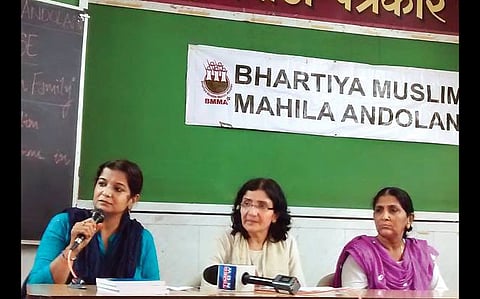

Following the Supreme Court's observation that there should be a review of the Muslim Personal Law, some provisions of which it said were biased against Muslim women, the Mumbai-based NGO Bharatiya Muslim Mahila Andolan (BMMA) has decided to launch a "public hearing" in Delhi advocating a ban on triple talaq, reported The Times of India.
During the hearing, Muslim women will narrate personal experiences of how some of the provisions in the laws, including arbitrary divorce and polygamy, have affected them adversely.
Zakia Soman, a founder member of the BMMA, told TOI, that there is a need to reform the Muslim Personal Law which includes several regressive practices, in order to avoid the introduction of a Uniform Civil Code (UCC).
"Only if we have reform in personal laws that do not encourage arbitrary divorces and polygamy that the possibility of uniform civil code can be averted. The religion and Quran gives space for reform, but it has not happened in the patriarchal setup of the Muslim Personal Law Board. For them, the time is never right," Soman told the newspaper.
The apex court recently said that it will examine the issue as it is related to the protection of fundamental rights of Muslim women guaranteed by the Constitution.
"It was pointed out that in spite of Constitutional guarantee, Muslim women are subjected to discrimination.There is no safeguard against arbitrary divorce and second marriage by her husband during currency of the first marriage, resulting in denial of dignity and security to her," TOI quoted the bench as saying earlier this month.
The Supreme Court has also asked the government to explain its stand on the Uniform Civil Code but the Union Law ministry is yet to respond.
Though the BMMA has been seeking reforms in the Muslim Personal law, the body has been opposed to the introduction of a Uniform Civil Code in the country.
"Under Article 25, the Constitution of India gives the right to all including minorities to have personal laws based on respective tenets of different religious communities. Under this provision we demand a gender just reform in the Muslim personal law based on the Quranic values of equality and justice in line with Article 25 of the Indian Constitution," the group said in a press statement earlier this month.
It further read, "The Supreme Court observation has emanated from the need to bring about a gender-just legal framework and not from desire to impose or force anything on different communities. This must be read as such and not as encouragement for hinduization of all laws and social practices."